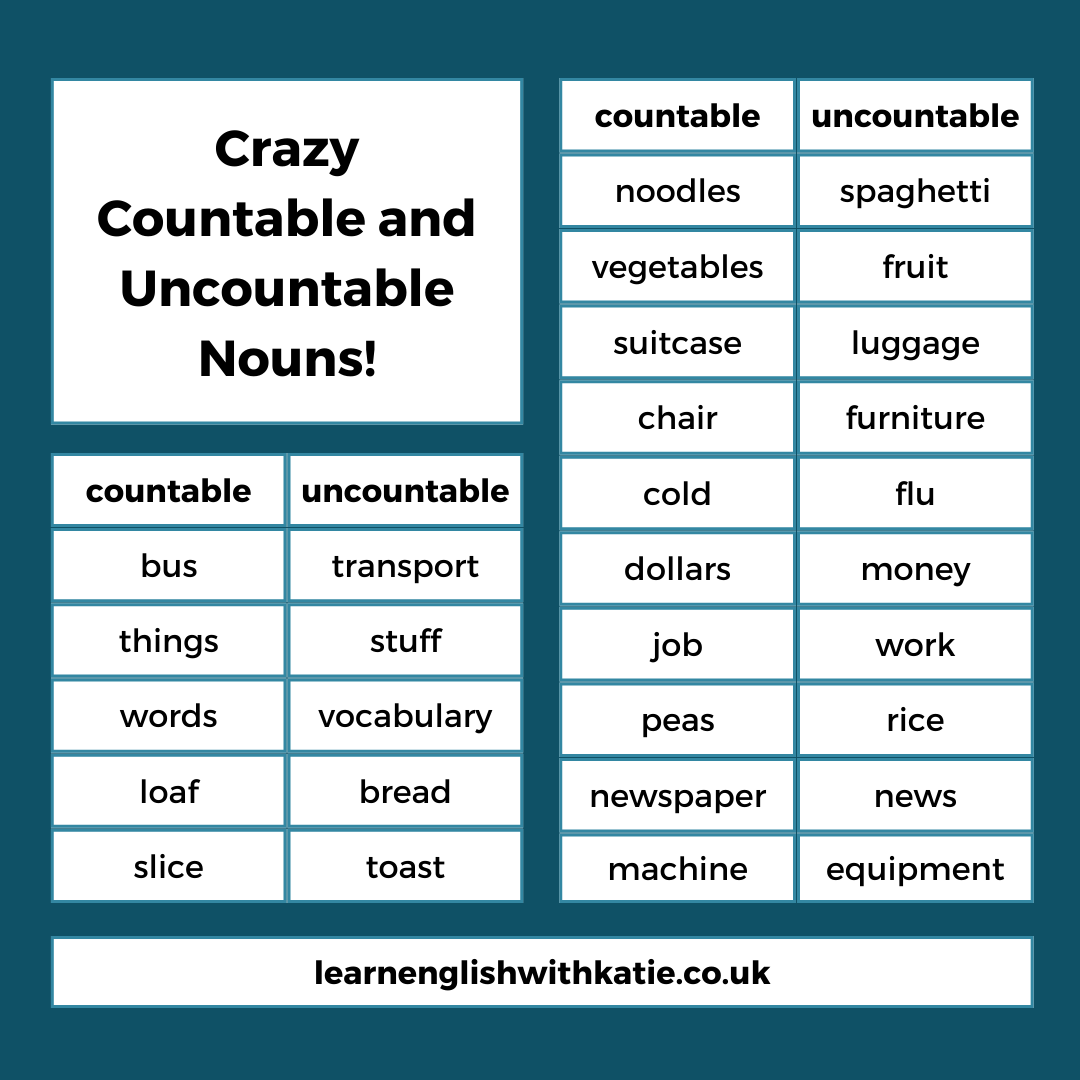Hello everyone!
Today’s lesson is all about countable and uncountable nouns. Before I explain anything, have a go at the quiz!
Quiz: choose the correct word
This/These spaghetti is/are delicious!
How much/many fruit do you eat?
You have a lot of luggage/luggages!
I need some new furniture/furnitures.
I have a flu/the flu.
I’m looking for a new work/job.
How many/much peas would you like?
The news is/are depressing.
How often do you use public transport/transports?
I want to learn more vocabulary/vocabularies.
I bought two trousers/two pairs of trousers.
How much/many people came to the party?
The answers are at the end but don’t check them just yet! Here are a few things to think about first.
Countable or uncountable?
Most of you have probably learnt that countable nouns are things that you can count. Simple, right? Usually, yes, but it isn’t always as obvious as that. It isn’t always logical. For example, “vegetables” are countable but “fruit” is uncountable. How can you possibly count noodles? But “noodles” is a countable word, as you can see because it ends in -s. This is crazy, right?!
I remember a student once asked me, “Why are peas countable? Who counts peas?!” Well, no sensible person is going to waste time counting peas but you could say “There’s a pea on the floor. Can you pick it up?” “A pea” means “one pea”. Also, the word has two forms - “pea” and “peas” - so it’s a countable noun.
Here’s another example. Did you know that “headache” is countable? It’s true that you probably won’t hear people say “one headache” or “two headaches” but we do say “I have a headache” and “I’ve been getting a lot of headaches recently” so it’s countable.
Another problem is that words might be countable in your language but uncountable in English. “Information”, “advice”, “furniture” and “bread” are words that are uncountable in English even though they are countable and can be plural (plural = more than one) in a lot of other languages. Similarly “spaghetti” is a plural word in Italian but we treat it as an uncountable noun in English.
A common confusion is words that have irregular plurals. The plural of “person” is “people”, the plural of “tooth” is “teeth” and the plural of “sheep” is “sheep”. These are all countable nouns even if there is no -s on the end. See this post for more information.
And while I’m here, let me mention plural nouns. These are nouns which are always plural, such as “clothes”, “trousers” and “scissors”. These behave a bit like countable nouns in some ways because they end in -s and take the plural verb, but in other ways, they are like uncountable nouns because you can’t use “a” or numbers.
Countable nouns:
can usually be counted - one chair, two chairs, three chairs etc
have a singular (one) and plural (more than one) form, usually made by adding -s (with some exceptions, as already mentioned)
can be used with “a” - “a job”, “a sheep”, “a pea” - because “a” means “one”.
can take the singular or plural form of the verb - “the job is …” and “the jobs are …”
can be used with “many” - “how many peas …?”
Uncountable nouns:
can’t be used with numbers
have only one form so you can’t add -s to make a plural
can’t be used with “a”. Don’t say “a work” for example.
take the singular form of the verb - “the work is …” and never “are”
can be used with “much” - “how much fruit”
Plural nouns:
can’t be used with numbers
have only one form which is always plural
can’t be used with “a”. Don’t say “a clothe” for example.
take the plural form of the verb - “the clothes are …”
can be used with “many” - “how many clothes …?”
Have a look at this list of countable and uncountable nouns, some of which might surprise you!
(There are actually some situations where some of these uncountable words can be countable. For example, you can say “He has a good vocabulary” but NOT “I want to learn more vocabularies”. “A good vocabulary” is countable, with “a”, and means “a good knowledge of words”. “Three fruits” means “three kinds of fruit”. )
Do you know any other crazy countable or uncountable nouns? You can share in the comments.
Now how about the quiz? You might want to go back to your answers now and check them for yourself. Then have a look at my answers and explanations below.
Answers
This spaghetti is delicious! (“Spaghetti” is uncountable in English so “this” and “is”.)
How much fruit do you eat? (“Fruit” is uncountable so use “much”.)
You have a lot of luggage! (“Luggage” is uncountable so no -s.)
I need some new furniture. (“Furniture” is uncountable so no -s.)
I have the flu. (You can say “flu” or “the flu” but not “a flu” because it’s uncountable.)
I’m looking for a new job. (After “a” you need a countable noun and “job” is countable.)
How many peas would you like? (“How many” because “peas” are countable.)
The news is depressing. (“News” is uncountable even though it ends with -s.)
How often do you use public transport? (“Transport” is uncountable so no -s.)
I want to learn more vocabulary. (“Vocabulary” is uncountable and cannot be plural.)
I bought two pairs of trousers. (“Trousers” is always plural. If you want to count them, you have to say “pairs of”)
How many people came to the party? (“People” are countable even though there is no -s. It’s an irregular plural.)
Put your email address in the box and you will get lessons, quizzes and learning tips in your inbox every week.
See you next time!
Katie





Really nice to read your message. Thanks dear Katie
Thank you so much teacher, it's really helpful